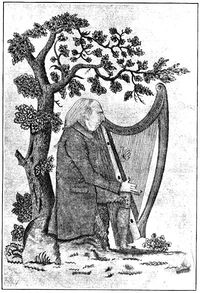Annotation:John Drury (2): Difference between revisions
Alan Snyder (talk | contribs) (Fix HTML, fix citation) |
m (Text replacement - "garamond, serif" to "sans-serif") |
||
| Line 1: | Line 1: | ||
=='''Back to [[{{BASEPAGENAME}}]]'''== | =='''Back to [[{{BASEPAGENAME}}]]'''== | ||
---- | ---- | ||
<p><font face=" | <p><font face="sans-serif" size="4"> | ||
'''JOHN DRURY [2]'''. AKA - "Welcome to Kingsland," "[[Planxty Kingsland]]." AKA and see: "[[Kathleen Asthore]]," "[[Caitlín a stór]]." Irish, Planxty (3/4 time). G Dorian (O'Sullivan): E Minor (S. Johnson). Standard tuning (fiddle). One part (S. Johnson): AB (O'Sullivan). Composed by blind Irish harper Turlough O'Carolan (1670-1738). Edward Bunting's (1773-1843) title for the tune was "Faulte goh Kingsland or Plangsty Kingsland." O'Sullivan (1958) finds the tune in the Forde manuscripts "John Drury" three separate times; as "[[Sorry to Part]]" (from Patrick Carey), "[[Caitín a Stór]]" (O'Farrell) and "[[Caitín mo Stór]]" (Deasy"). See note for "[[John Drury (1)]]" for O'Sullivan's notes on the subject of the title. | '''JOHN DRURY [2]'''. AKA - "Welcome to Kingsland," "[[Planxty Kingsland]]." AKA and see: "[[Kathleen Asthore]]," "[[Caitlín a stór]]." Irish, Planxty (3/4 time). G Dorian (O'Sullivan): E Minor (S. Johnson). Standard tuning (fiddle). One part (S. Johnson): AB (O'Sullivan). Composed by blind Irish harper Turlough O'Carolan (1670-1738). Edward Bunting's (1773-1843) title for the tune was "Faulte goh Kingsland or Plangsty Kingsland." O'Sullivan (1958) finds the tune in the Forde manuscripts "John Drury" three separate times; as "[[Sorry to Part]]" (from Patrick Carey), "[[Caitín a Stór]]" (O'Farrell) and "[[Caitín mo Stór]]" (Deasy"). See note for "[[John Drury (1)]]" for O'Sullivan's notes on the subject of the title. | ||
<br> | <br> | ||
| Line 10: | Line 10: | ||
</font></p> | </font></p> | ||
[[File:arthuro'neill.jpg|200px|thumb|left|Arthur O'Neill]] | [[File:arthuro'neill.jpg|200px|thumb|left|Arthur O'Neill]] | ||
<p><font face=" | <p><font face="sans-serif" size="4"> | ||
''Source for notated version'': harper Arthur O'Neill [http://en.wikipedia.org/wiki/Arthur_O%27Neill_%28harpist%29] c. 1737-1816) [Bunting]. | ''Source for notated version'': harper Arthur O'Neill [http://en.wikipedia.org/wiki/Arthur_O%27Neill_%28harpist%29] c. 1737-1816) [Bunting]. | ||
<br> | <br> | ||
<br> | <br> | ||
</font></p> | </font></p> | ||
<p><font face=" | <p><font face="sans-serif" size="4"> | ||
''Printed sources'': | ''Printed sources'': | ||
O'Sullivan, "The Bunting Collection of Irish Folk Music and Songs," | O'Sullivan, "The Bunting Collection of Irish Folk Music and Songs," | ||
| Line 23: | Line 23: | ||
<br> | <br> | ||
</font></p> | </font></p> | ||
<p><font face=" | <p><font face="sans-serif" size="4"> | ||
''Recorded sources'': <font color=teal></font> | ''Recorded sources'': <font color=teal></font> | ||
</font></p> | </font></p> | ||
Revision as of 13:30, 6 May 2019
Back to John Drury (2)
JOHN DRURY [2]. AKA - "Welcome to Kingsland," "Planxty Kingsland." AKA and see: "Kathleen Asthore," "Caitlín a stór." Irish, Planxty (3/4 time). G Dorian (O'Sullivan): E Minor (S. Johnson). Standard tuning (fiddle). One part (S. Johnson): AB (O'Sullivan). Composed by blind Irish harper Turlough O'Carolan (1670-1738). Edward Bunting's (1773-1843) title for the tune was "Faulte goh Kingsland or Plangsty Kingsland." O'Sullivan (1958) finds the tune in the Forde manuscripts "John Drury" three separate times; as "Sorry to Part" (from Patrick Carey), "Caitín a Stór" (O'Farrell) and "Caitín mo Stór" (Deasy"). See note for "John Drury (1)" for O'Sullivan's notes on the subject of the title.
Irish researcher Conor Ward found a version of the planxty with a unique third strain in the c. 1885 Francis Reynolds music manuscript collection, of Gaigue, Ballinamuck, County Longord, where it appears under the title "Planxty Kinston" (likely a corruption, remarks Ward, of the placename 'Kingsland' in Bunting's title "Fáilte Romhad go Kingsland". "Planxty Kingsland" was recorded by the Belfast Northern Star of July 15, 1792, as having been played in competition by one of ten Irish harp masters at the last great convocation of ancient Irish harpers, the Belfast Harp Festival, held that week. Ward notes: "The tune also appears in the Leonard-Kernan MS (c. 1845) of Abbeyshrule, Co. Longford as "Planxty Drury" and in the Stephen Grier MS (c. 1883) of Gortletteragh, Co. Leitrim, with the same title and key of A Dorian (Kernan has incorrectly indicated A major)...Reynolds copied a lot of his tunes from another manuscript written by a relation of his--the Patrick O'Farrell MS (c. 1860s) [Aughadowry, Ballinamuck, Co. Longford]. While 'Planxty Kinston' is not in the O'Farrell MS there are pages missing from that manuscript one of which probably contains 'Planxty Kinston' from which Reynolds copied."

Source for notated version: harper Arthur O'Neill [1] c. 1737-1816) [Bunting].
Printed sources:
O'Sullivan, "The Bunting Collection of Irish Folk Music and Songs,"
Journal of the Irish Folk Song Society, vol. 22, 1927, p. 39 (tune no. 10a, as "Welcome to Kingsland").
Complete Collection of Carolan's Irish Tunes, 1985; No. 43, p. 47. S. Johnson (Kitchen Musician No. 3: Carolan), 1983 (revised 1991, 2001); p. 14. Mulhollan (Selection of Irish and Scots Tunes), Edinburgh, 1804; p. 34. O'Sullivan (Carolan: The Life, Times and Music of an Irish Harper), 1958; No. 43.
Recorded sources:
